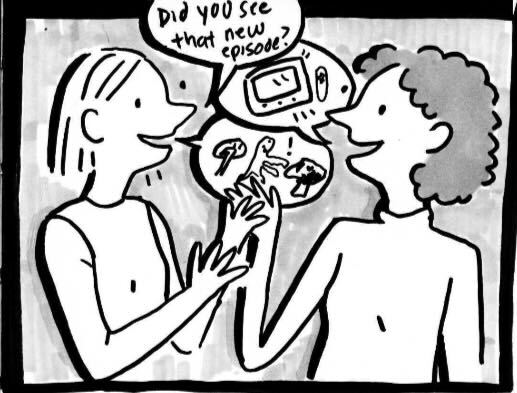Opinion | Weekly TV releases are so much better than binge-watching
April 6, 2023
It’s that time of year again. No, not just the end of the semester or Passover — It’s the time of year when all of my TV shows come back, and every Sunday feels like Christmas.
As an avid “Succession,” “Barry,” “Ted Lasso” and “Abbott Elementary” fan, I am glued to the TV most nights of the week. And as soon as I turn the TV off, I am glued to Twitter to read everyone’s theories on what’s going to happen next week, or text my friends to reflect on what we just watched.
This is what watching TV should look like. It is a communal moment in which everyone can feel some kind of connection as we all watch the same show at the same time. With the influx of streaming services and seasons of shows dropping all in one day, we are missing out on the crucial cultural experience that is watching TV. Weekly releases are what TV should look like.
While it is nice on occasion when a show you’ve looked forward to watching drops all the episodes at once, because there’s a season’s worth of television to watch, everyone watches at their own pace. The different watch schedules then make people wary to tweet about the shows in order to not spoil it to their friends who didn’t binge the whole thing.
Additionally, there are no theories to speculate on when you binge-watch, as all of the answers to your questions on the show are answered if you just keep watching. There is no suspense. My favorite thing about watching TV is questioning what will happen next. With shows like Succession and Barry in which the characters’ moves are somewhat unpredictable, the suspense of waiting a week to see what they do next is what makes the show interesting. If you’re like me, you’ll spend the next week scrolling through Twitter to find theories, talking to anyone who has even heard about the show to see what they think will happen next and waiting with bated breath for the next episode.
TV as a cultural event is not a new thing. Since its inception, TV has brought people together to watch new stories unfold. Important shows gave people something to talk about at work and at school and became something that everyone remembers. Binge-watching is ruining this beautiful thing. There is no sense of community when everyone is watching things at different paces. There are too many options and too many TV shows on air at once. Having something to look forward to is what makes TV special.
All of this has got me thinking about the effect of networks like HBO that foster this communal environment. Shows like “The Sopranos” began this new wave of communal TV. TV originated in the 1950s, when there were minimal television channels, so everyone watched pretty much the same shows. But as it expanded, its quality diminished. Soon there were too many channels, too many shows and, most recently, too many streaming platforms to watch it on. HBO, however, changed the landscape. TV shows became cultural moments again, and with it, their budgets and quality grew as well.
While this is a dramatic way to describe something that has become so ubiquitous, television’s importance cannot be understated. Just like film and theater, creativity is essential to expand the medium. When there is new and creative art, more people will watch and it can become implanted into our cultural history.
In this same vein, making TV is hard work. It requires years of pre-production and post-production and hundreds of people to write, direct, film, dress and promote a new show. People spend millions of hours and dollars to create something new. When a new television show hits the market, it must compete with hundreds of others. Not only is it important creatively to space out episodes, but for a show to survive, people need to talk about it.
Dropping all the episodes at once makes a show become a blip in the eyes of the public. It may briefly have its moment in the sun, but usually for a shorter amount of time. Stretching out a season for a month or two means that people can talk about the show for that amount of time. The more people talk about it, the more people will want to watch it so they can become a part of the cultural landscape.
While this column is slightly my self-indulgent way to talk about “Succession” before I graduate, I do think that this is an important way to look at television as a medium. I love TV — as you can see by the many columns I’ve written on the topic — and I think it deserves the seriousness of film and theater in the public eye. Treating TV shows as something that is just dropped onto the public or something stupid for people to take their minds off their lives is how we get to the laziness of the binge-watch. We are currently in another Golden Age of TV. However, if we continue to disrespect the medium with full-season drops, we will lose what makes television so great — community.
Rachel Soloff writes primarily about the entertainment industry and how lame antisemites are. Write to her at [email protected].



